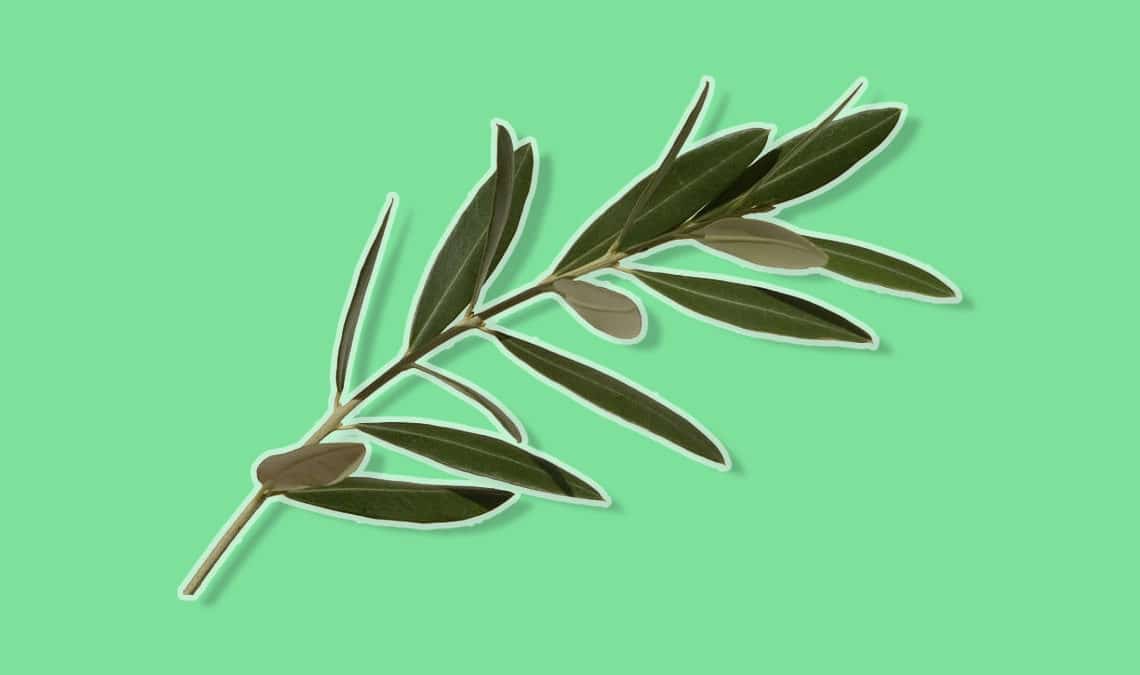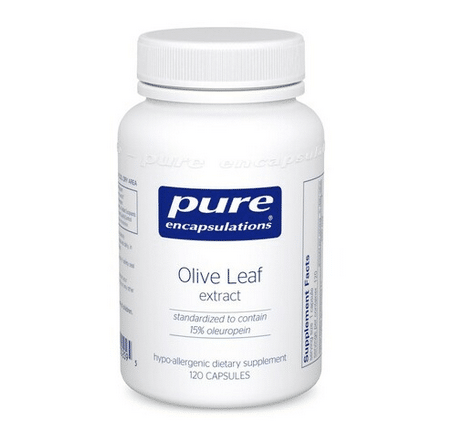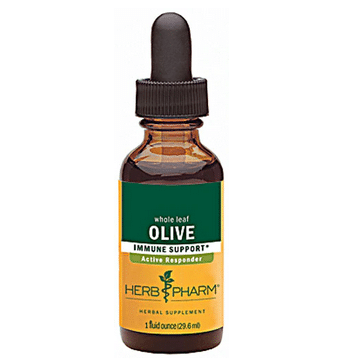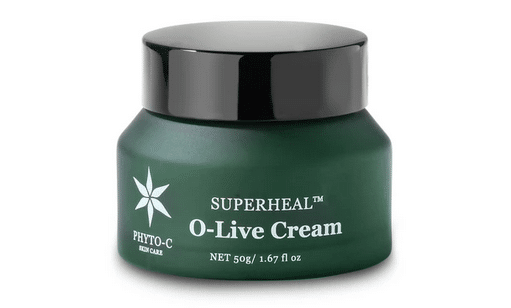
Everyone knows that olive oil is healthy. You probably even know that this is because of the kind of fat in it–olive oil is perhaps the best source of monounsaturated fat, which lowers LDL and raises HDL cholesterol.
It turns out however that olives have another secret ingredient: olive phenols, a class of phytonutrients unique to olives and olive leaves. These appear to contribute to the benefits of olive oil. But in higher concentrations, they may have a whole host of other benefits.
Olive leaf extract has started to become a popular supplement not only for improving cholesterol, but also for improving overall cardiovascular health, lowering cancer risk, and even losing weight and improving skin health. But can it really do all that? The research supports some of those ideas more than others.
The Many (Potential) Olive Leaf Extract Benefits
Olive leaf extract–or rather its active ingredients, olive phenolics, including but not limited to hydroxytyrosol and oleuropein–have quite a wide variety of potential benefits, some better-researched than others. In general, the cholesterol-related benefits are beyond dispute at this point, while the others could use a few more studies.
Olive Leaf Extract, Cholesterol
Olive oil has long been known to have beneficial effects on cholesterol, both lowering LDL cholesterol as well as raising levels of HDL cholesterol. The benefits are proportional to the level of polyphenols in olive oil–and polyphenols are the active ingredient in olive leaf extract.
Olive oil polyphenols appear to work in part by reducing expression of the CD40L gene, which is involved in atherogenic (arterial plaque buildup) and inflammatory processes.
Unsurprisingly then, olive leaf extract also lowers LDL and raises HDL cholesterol levels. A 2015 study by Olmez et al found that olive leaf extract reduced total and LDL cholesterol in rats fed a diet high in fat and cholesterol.
A human study from 2017 by Lockyer et all found an even greater rage of benefits. People who took an olive leaf extract supplement benefitted from lower total and LDL cholesterol, lower blood pressure, and lower triglycerides. Levels of interleukin-8, a marker of inflammation and immune response, were also reduced.
Olive Leaf Extract For Blood Pressure
As previously mentioned, the Lockyer study demonstrated a decrease in blood pressure from olive leaf extract supplementation. Several other studies have confirmed that olive leaf extract reduces blood pressure.
Other studies have demonstrated that olive leaf extract may be an effective treatment–or adjunct to pharmaceutical treatment–for patients with hypertension. One study found that olive leaf extract lowered blood pressure and LDL cholesterol in rats with borderline hypertensive blood pressure.
Two different dosages were used in addition to a control group, and the effects were found to be dose-dependent; the higher dose produced a greater reduction in cholesterol, and was the only dosage to reduce blood pressure.
A human study by Susalit et al actually compared olive leaf extract to the blood pressure drug Captopril. Both groups experienced significant decreases in both systolic and diastolic blood pressure, although the Captopril group saw non-significantly greater decreases. The olive leaf group also experienced significant decreases in triglycerides, while the Captopril group did not.
One caveat is that dosing was adjusted for the Captopril group, but not the olive leaf group. The olive leaf extract group took 500 mg of olive leaf extract twice a day for the entire duration of the study. The Captopril group started out on a dosage of 12.5 mg twice a day, but 2 weeks into the 8-week treatment period, some patients had their dosage titrated up to 25 mg twice a day, based on their response to treatment.
This is of course the standard and correct way of dosing drugs in practice. In the study however, it should have been done either with both groups or with neither. Thus, it is probably that the olive leaf group could have seen even better results had their dosages also been adjusted on an individual basis.
Olive Leaf Extract For Insulin Sensitivity And Glucose Metabolism
A few studies suggest that olive leaf extract can lower blood glucose and insulin levels, and improve insulin sensitivity.
One study on middle-aged overweight men found that olive leaf extract improved insulin sensitivity, as well as pancreatic beta cell responsiveness–a measure of insulin production.
In both diabetic humans and rats, olive leaf extract has been shown to reduce insulin and glucose levels and improve glucose homeostasis. This appears to be partly due to reducing the digestion and absorption of starches. If that’s the case then it’s possible that olive leaf extract, when used for this purpose, may be best taken shortly before meals, not unlike digestive enzymes.
Olive Leaf Extract For Herpes, Shingles, And Other Antiviral Uses
This one is really out of left field–olive leaf extract appears to help combat herpes viruses. One in vitro study found that olive leaf extract, in combination with the antiviral drug acyclovir, reduced the viral load of herpes simplex virus (that’s the sexually transmitted herpes virus) more than did acyclovir alone.
The study did not suggest that olive leaf extract alone was an effective treatment for herpes, but merely that it could be a valuable adjunct to pharmacological treatment. Because acyclovir and other antivirals can have side effects such as nausea or diarrhea, olive leaf extract may allow them to be used at a lower dose to minimize side effects.
Since it is effective against herpes simplex virus, it’s also very likely that olive leaf extract would be helpful in treating herpes zoster–the virus that causes shingles. As of yet there are no studies on this– probably because people usually recover from shingles too quickly to be recruited for a study.
Other studies have suggested that olive leaf extract has broader antiviral effects. It appears to reduce the in vitro infectivity of viral haemorrhagic septicaemia rhabdovirus (VHSV), and one study has even suggested efficacy in inhibiting viral replication in HIV. Both of these studies were in vitro, however.
An in vivo study on high school athletes found that olive leaf extract did not prevent upper respiratory infections such as the common cold, though it did seem to reduce the duration of illnesses when they occurred.
As of this time, olive leaf extract appears to be helpful as an adjunct treatment for herpes viruses, and is probably worth taking if you have a cold. It’s too early to recommend it for treating any other viruses.
Olive Leaf Extract And Weight Loss
Given that olive leaf extract improves insulin sensitivity, you would expect it to aid weight loss as well. There’s some indication that it does, but perhaps less than you’d expect.
One Japanese study did find that olive oil consumption reduced carbohydrate absorption, but it appears to have been taken off the internet. The previously mentioned study by Wainstein et al found the same thing, but did not measure the body weight of participants.
At least two other studies have measured subjects’ body weight purely as a matter of course, despite that not being the ostensible goal of the study–they did not find significant changes in weight.
Theoretically, improvements in insulin sensitivity and reductions in carbohydrate absorption should lead in the long term to reduced body weight. Improvements in blood sugar and triglycerides should also make it easier to exercise, which would aid weight loss. Overall though, olive leaf extract appears to be, at best, useful as a minor component of a weight loss supplement stack. There are simply a lot of better weight loss supplements out there.
Olive Leaf Extract Is An Antioxidant
Olive leaf extract exerts anti-oxidant effects, reducing levels of oxidized LDL cholesterol and lipid peroxide, while increasing glutathione peroxidase. Antioxidants could have anti-aging benefits, but this is mainly useful for explaining some of olive leaf extract’s other benefits. In particular, antioxidants protect against DNA damage–as you’ll see, this explains at least two other benefits of olive leaf extract.
Olive Leaf Extract Benefits For Skin And Sunburn Protection
Olive leaf extract protects against skin damage caused by UV-B radiation. In other words, olive leaf protects against sunburn. Notably, this has been demonstrated with oral olive leaf extract supplementation, so you don’t necessarily need to apply it topically to the infected area.
The researchers theorized that the effect was partly due to inhibiting the formation of reactive oxygen species. In other words, it was due to olive leaf’s antioxidant effects.
Topical olive leaf extract may help to not only protect against sunburn, but heal the damage after it’s been done. However this is based on an industry-funded study. The skin cream containing olive leaf extract also had another active ingredient: ceramides, a family of waxy lipid molecules which form the main component of the outermost layer of the skin.
The cream was not tested against one that didn’t have olive leaf extract. It therefore cannot be ascertained that the effects were due to olive leaf extract, rather than ceramides. What can be said is that the combination of olive leaf extract and ceramides can rejuvenate skin (facial skin in particular), improving hydration and reducing wrinkles.
Olive Leaf Extract And Cancer
Given the role of oxidative damage and inflammation in cancer, and the fact that olive leaf extract is both anti-inflammatory and an antioxidant, you would expect it to help prevent cancer. And indeed it seems to.
As the authors of one research review noted, “A plethora of minor constituents in olive oil have been identified as effective agents in mitigating the initiation, promotion and progression of multistage carcinogenesis.” A multitude of studies found that olive leaf extract inhibited one or more of the stages of cancer development, particularly breast cancer.
This does not suggest that olive leaf extract can treat cancer, although it may be useful as an adjunct to treatment, to prevent further proliferation. Primarily it suggests that regular olive leaf extract or olive oil consumption can reduce the risk of cancer.
How To Take Olive Leaf Extract
Olive leaf extract is usually consumed in capsule form, and capsules are usually 500 mg. Based on studies, a standard dosage would be 1000 mg a day, split into two daily doses.
For comparison purposes, consuming olive oil provides the equivalent of tens of milligrams a day. Despite being an order of magnitude lower, that’s not nothing– it does improve lipid and cholesterol profiles, partly because the fat content of olive oil–absent from olive leaf extract–also helps with cholesterol. So there is a good argument for consuming both olive oil and olive leaf extract if your main concern is cholesterol. However, olive oil probably won’t provide the other benefits of olive leaf extract.
Most indications are that timing is not very important. However, given the evidence that olive leaf extract improves insulin sensitivity partly by reducing starch absorption, people who wish to use it for that purpose may want to take their olive leaf extract 30 to 120 minutes before meals.
If using an olive leaf skin cream, apply twice a day, or shortly after sun exposure. If applying before sun exposure, you’d want to put the olive leaf cream in first, let it set in, then apply the sunscreen over it. In other words, sunscreen has to lay on top of your skin forming a barrier, whereas olive leaf cream needs to get into your skin.
The Best Olive Leaf Extract Brands

Best Olive Leaf Extract Capsules (Also Vegetarian)
Pure Encapsulations Olive Leaf Extract, 500 mg, 120 Capsules
Pure Encapsulations uses vegetarian capsules made with hypoallergenic cellulose fiber, so this product is perfect for vegans and people with sensitive immune systems. This product uses the same 500 mg dose used in studies, so you can easily take two a day to get the recommended dosage. Pure Encapsulations is known for their high-quality products– in fact much of their business comes from selling through doctors– and this product is fulfilled by Pure Formulas, one of the most trustworthy supplement marketplace sites.

Best Organic Olive Leaf Extract – Liquid
Herb Pharm Olive Leaf Extract – 4 oz
Herb Pharm is one of the best-known herbal supplement brands, and has some of the best quality control when it comes to liquid supplements in particular. Their liquid supplements are known for being well-mixed, i.e. the active ingredient doesn’t tend to congeal at the bottom as it does with many brands. That said, you do want to gently swirl the bottle around a bit before dosing, just to make sure.
This product contains 576 mg per dropper– close enough to the standard dosage, and of course liquid allows you to easily adjust the amount. At 168 servings per bottle, this is also the most cost-effective olive leaf extract available from a high-quality manufacturer.

Best Olive Leaf Extract Skin Cream
SuperHeal O-Live Cream
This is the exact cream used in the aforementioned study which demonstrated that creams combining olive leaf extract and ceramides could regenerate facial skin. It is scientifically proven to improve hydration, reduce wrinkles, and reduce the apparent age of skin. It’s not cheap, but if you use it sparingly and only on your face, one 50 gram bottle can last anywhere from one to three months.
Editor’s note: we are regularly updating this review. If you see any problems, weird interpretations of the data, or just want to say hi, please reach out to hello@the-unwinder.com.
